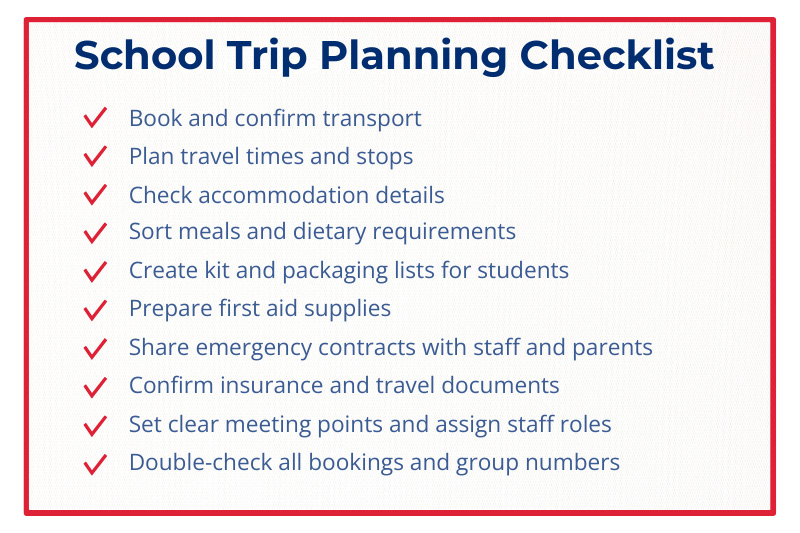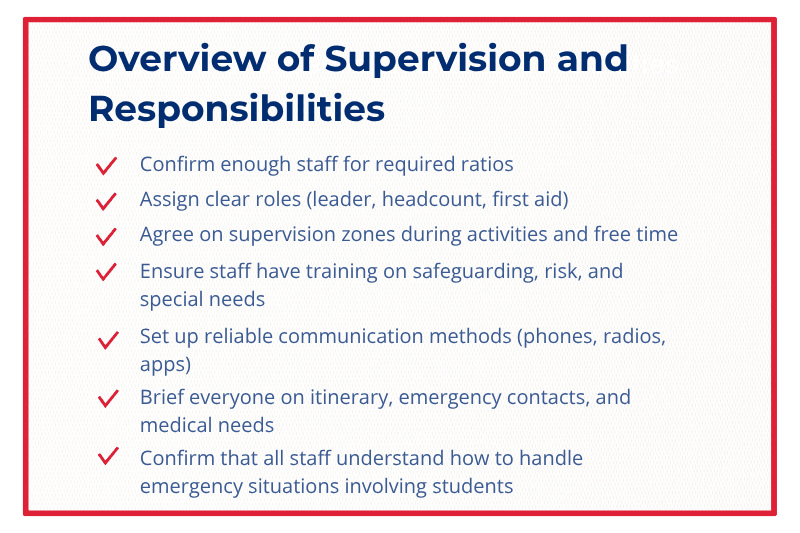Taking your class away is exciting, and with some planning, you can organise your school trip with ease—giving them a chance to learn beyond the classroom and come home with great memories.
In this guide, we’ll take it step by step to make planning simpler.
Set Clear Objectives and What You Want to Achieve
Before you start choosing and inquiring with a school tour operator, take a moment to think about what you really want this trip to achieve. Is it to give them a deeper grasp of a topic? Or is it more about helping them build confidence, teamwork skills, and independence?
Once you know your goal, the rest is easier. It’ll shape what you plan, help you secure approval, and give parents a clear sense of why school trips are important for their child’s growth.
Choose the Right Destination for Your Group
Before settling on a place, be clear on why you’re taking the trip. Is it to support what the students are learning or to help them grow in other ways? Choose somewhere that matches what you want to achieve and is practical for everyone.
It can also help to ask colleagues for trip ideas for schools they’ve tried before—hearing about real experiences often gives you a clearer picture and sparks new inspiration.
Checklist to consider:
- Does the destination support your learning or development goals?
- Is it easy and safe for all students to get there?
- Can the trip fit your time and budget constraints?
- Have you asked others what they thought of the trip?
Think Through Safety and Potential Risks
There are always some risks on a school trip, which is why planning ahead is key to keeping everyone safe. A thorough risk assessment is your best tool to identify potential hazards and put control measures in place before you even step out of the door.
Here's how to approach it:
- Look out for possible risks and plan ahead
Take a proper look at your plan and see what might go wrong—travel, activities, venues, health needs, even packed lunches or kids wandering off. Then think about how likely each one is and how bad it could be if it did happen. It shows you which things to focus on first. - Think about who might be affected
Keep in mind all the students, particularly anyone who might need extra help, as well as staff and volunteers. - Plan how you'll reduce risks
Plan the steps that will help keep the group safe—for example, extra staff, clear safety instructions, and making sure outside providers have all the right checks and insurance. - Write it all down and keep it updated
Write down your plans and checks so everyone’s clear and you’ve got proof you’ve covered everything.
If you’re having outside organisations, make sure they’ve got proper safety checks in place—the Learning Outside the Classroom (LOtC) Quality Badge is a good sign to look for. If your trip’s abroad or more adventurous, you’ll need to plan in extra detail.
Doing all this isn’t just about ticking boxes. It’s what makes students feel safe and confident, so they can really enjoy the trip and get the most out of it.
Plan Transport and All the Practical Details
Here’s a sample checklist to guide your planning and keep things organised. Use it as a starting point and adjust it to fit your trip’s needs. It’s worth taking the time to get these bits right—so the day itself runs smoothly and you can focus on supporting your students.

Many teachers like to work through a checklist step by step. It keeps you on track, even if plans shift at the last minute.
Manage the Budget Carefully
Keeping on top of the budget makes everything else feel much easier and saves a lot of headaches later. Here’s a straightforward way to break it down:
- Set your total budget
Check what is coming from the school, parents, or any grants. Be honest about what is realistic so you do not promise more than you can deliver. - Get your total quotes early
Sort prices for transport, accommodation, activities, all the big parts, as soon as you can. This helps avoid last-minute surprises. And if you’re planning school trips to Europe, getting quotes early is key to avoiding extra costs and paperwork. - Consider using a school tour operator
They can bundle transport, accommodation, and activities into one clear package price, making it easier to manage costs and spot potential savings. - Plan for unexpected extras
Always leave a bit aside for those costs that pop up out of nowhere. There is always something, whether it is extra kit, a late booking, or a change in group numbers. - Be clear with parents and staff
Share a simple breakdown of costs so everyone knows what is included, what is not, and when payments are due. It saves a lot of follow-up questions later on. - Check in as you go
Keep an eye on spending with a simple spreadsheet or tracker. It does not have to be fancy—just enough to spot if anything is starting to drift.
Being open and organised with money keeps everyone reassured and avoids awkward surprises later on.
Organise Your Supervision Team
Your supervision team is the backbone of a safe, successful trip. Start by selecting the right people, clear roles, and good communication in place makes all the difference to how smoothly a trip runs. Clear roles mean fewer problems and more confidence in looking after the group.
This checklist will help you get it all covered:

A well-prepared supervision team means fewer headaches and more confidence, letting you focus on the trip itself. If everyone’s clear on their role and talks to each other, it makes for a calmer, more confident trip.
Prepare Students for the Trip
Get the students ready well before the trip. It makes things run smoother and keeps the nerves down. A bit of excitement is good—you just don’t want it turning into worry. Go over the plan early so nothing catches them off guard on the day.
Before you head off, talk about things like:
- Why you’re going and what you hope they’ll take away from it
- The main schedule—travel times and key activities
- Behaviour expectations and school rules
- Safety basics, including what to do if they get separated from the group
- What to pack (and what’s better left behind)
- Any special arrangements such as medication or meal needs
- Time for questions so they can raise any concern
If you can, show a few photos or talk through different destinations you’ll visit. It helps them picture the trip and feel more involved before you even set off.
Keep Everyone Updated and Informed
Good communication makes the trip run smoother and takes some of the load off you. Share the plan early and include what to bring, payment info, and any special arrangements. Drop in a reminder or two so nothing gets forgotten.
Parents should have a way to reach you if there’s an emergency, and it helps if they know what updates they’ll get while you’re away. Keep your team posted as well—especially if plans change once the trip’s underway.
Be Ready for the Unexpected
Even with the best planning, things can change fast on a school trip. A delayed bus, a sudden illness, a forgotten passport—it happens. The key is being ready to handle it calmly.
Build in time for delays and have a few backup options where you can. Make sure you’ve got access to all the key documents—medical info, contact lists, booking confirmations—ideally both printed and saved digitally.
It’s also worth making sure your staff know what to do if something goes wrong. A quick run-through of emergency actions before the trip can make all the difference.
When everyone’s informed, it’s easier to focus on enjoying the trip without last-minute chaos.
Why a School Tour Operator Can Make All the Difference
You can plan a school trip yourself—but it takes time, energy, and careful attention to legal requirements. If you work with a school tour operator, here's how they can make things easier:
- They save you a lot of time - one point of contact for travel, accommodation, activities... even the paperwork.
- Costs are easier to keep track of - everything's in one price, so you're not chasing half a dozen invoices.
- They think about safety for you - from risk assessments to checking every provider, it's one less thing on your plate.
- They plan around your group - not every class learns the same way, so they'll tweak the trip to fit.
- You stay on the right side of the rules - they know how to meet requirements like the Package Travel and Linked Travel Arrangements Regulations.
- If something changes, you're not on your own - a late bus or last-minute cancellation? They've got backup plans ready.
- Financial protection - tour operators are legally obliged to protect your money until the day you return from your trip.
At Interschool Travel, we specialise in creating safe, seamless, and memorable trips for schools of all sizes. From the first inquiry to the journey home, our team takes care of every detail so you can enjoy the experience as much as your students.
Look Back and Plan Ahead
When you're back and the dust has settled, take a moment to reflect. What went well? What would you change next time? Even a short chat with your team or a couple of quick notes can make planning the next trip easier.
If you’d like some extra help or new ideas, we can work with you to make your school trips safe, well organised, and memorable.
Get in touch with us today—let’s start planning your next school trip together.
.jpg)
.jpg)
.jpg)
.jpg)